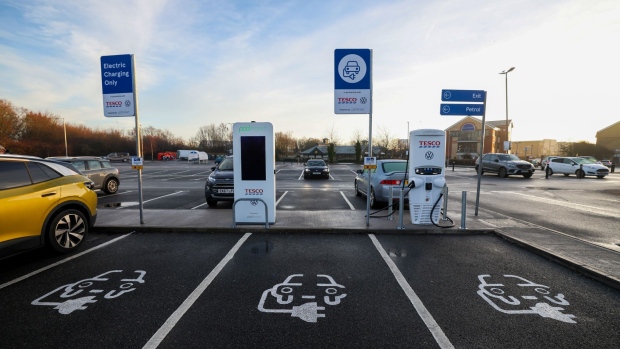Mar 24, 2022
U.K. Targets Tenfold Increase in Electric Vehicle Charge Points
, Bloomberg News

(Bloomberg) -- The U.K. government pledged to increase the number of public chargers for electric vehicles to 300,000 by 2030, backed by £1.6 billion ($2.1 billion) of funding, as it seeks to phase out oil-burning cars.
The country has banned the sale of new gasoline and diesel cars from 2030, which will require an expansion of its charging network. The majority of households in cities and urban environments don’t have access to private parking, meaning they’d need on-street chargers to replenish their car’s batteries.
“No matter where you live -- be that a city center or rural village, the north, south, east or west of the country, we’re powering up the switch to electric and ensuring no one gets left behind in the process,” Transport Secretary Grant Shapps said in a statement on Thursday.
The government will invest £500 million to build “competitively priced” public-charge locations across the country, while an existing £950 million rapid-charging fund will be used to roll out at least 6,000 points across England’s motorways by 2035.
The private sector will also play a role in build-out of the country’s charging infrastructure, with the government pledging to remove barriers such as delays to planning permission or high connection costs, according to the statement.
BP Plc’s EV infrastructure unit will invest £1 billion in a separate plan. The investment will go toward developing ultra-fast chargers as well as more home-charging services, Richard Bartlett, senior vice president at BP Pulse, said in the statement.
Energy giants BP and Shell Plc are among companies that are pledging to increase the number of EV charge points available. In 2018, BP bought Chargemaster, the largest operator in the U.K. Shell bulked up its own EV network last year when it bought Ubitricity.
©2022 Bloomberg L.P.






